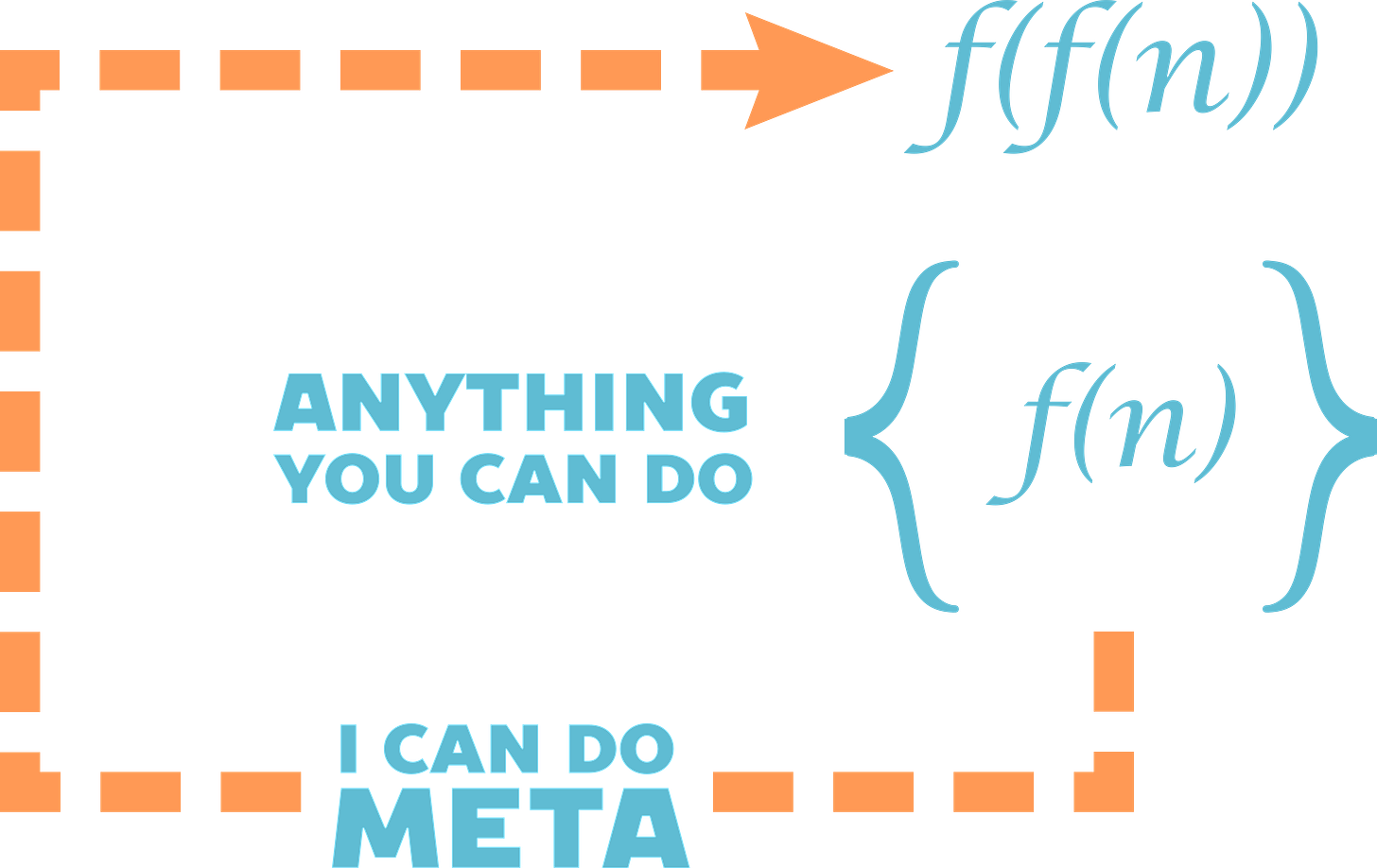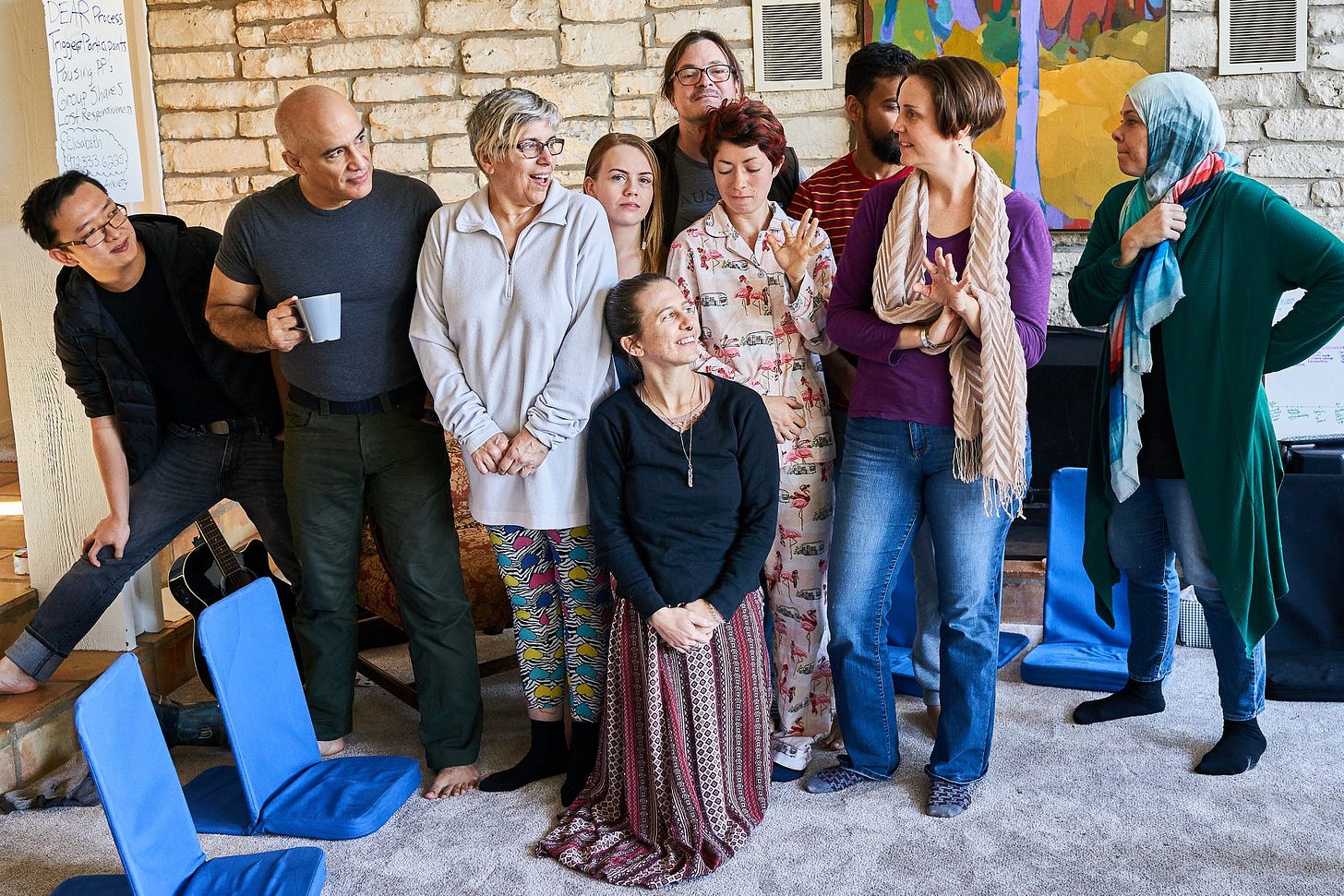This is a short reflection on something I found fascinating.
The weekend before last, I was at a rationality conference. Rationalists are people who focus on thinking more effectively (aka with less biases). They tend to be interested in existential risk, AI, effective altruism (EA) and living in the Bay Area. Most seem to spend their time creating thinktanks and writing brilliant essays on LessWrong.
They are also disproportionally autistic. You don’t have to go to a conference on neurodivergence to find neurodivergent people: they’re all hanging out at EA and LessWrong meetups anyways. They are the ones who put this on a shirt:
In short, they have some fun overlaps with the AR and Circling crowds, because both like talking very directly about subtext - and rarely understand it.
At the event last weekend, which was a small-ish unconference event put on by a rationality teacher I love (Duncan Sabien, who writes a wonderful Substack of his own), I led an Authentic Relating event with my friend Ethan Sawyer.
One of the main games we played was Spectrum. I learned recently, from attending a psychodrama workshop, that the name of this sort of group-dynamics-mapping is “sociometric games”. I am obsessed with them as a way of disambiguating and playing around with group conflict, belonging, and inclusion.
In Spectrum, the facilitator designates one side of a circle (I usually do it as “to the left of me”, but a chair works nicely as an endpoint if you want to include yourself in the spectrum) as one extreme, and another side (“to the right of me/this chair”) as another extreme. This can also be done as a line from one side of the room to another.
People can sort themselves anywhere along the Spectrum. The facilitator then takes shares about experiences at different points on the continuum.*
*This game can be found in the Authentic Relating Games PDF, print, or video manual if you want the more complete version, or other games.
Prompts I use often include things like:
Who came from the furthest/closest away?
Which is better: cats or dogs?
How much do you feel a sense of belonging in/being “part of” this group?
How much power do you think you hold in this group? (This is particularly fun if, after you view the original spectrum, people can sort others where they THINK they should go)
Do you wish the pace of this event was faster or slower?
After a few prompts, I open the game up to the group: “What would YOU like to know about our distribution?”
In this event, one of the prompts I used was: “How much does neurodivergence affect your life?”
I wasn’t particularly interested in HOW neurodivergent people considered themselves to be, or what their diagnoses were. I didn’t want to make anyone out themselves publicly. But given the interests and relating style of this group, I was pretty sure almost everyone would be on the mid- to very side of that spectrum, so the followup seemed relevant. (If people weren’t neurodivergent, I assumed they would just sort themselves to the “doesn’t affect me much” part of the circle.)
What I saw was very unexpected.
The majority of people massed on the “doesn’t affect me much” side. There was a fair distribution towards the middle, and few people on the “affects me a lot” side.
I wrote this article because I found the shares as to why people sorted themselves where they did very informative. They told me a lot about how people navigate neurodivergence in their own lives.
Low Affect
From people clustered on the “doesn’t affect me much” side, I heard a common experience.
A few people shared that they were diagnosed late in life as being on the far side of that spectrum. The most common reason for getting tested was something like “my partner/friend pointed out that I had a lot of these traits, or looked at me with a “duh” face when I asked if they thought I might be autistic.”
However, by this point in life, they had already built a social group of people who surprisingly also just happened to be neurodivergent. Within that small-world network, they were normal. So getting the diagnosis didn’t affect their life much. These days, as I’ve written about before, we build our own belonging.
Medium Affect
Towards the middle of the Spectrum, one person shared that she didn’t experience her neurodivergence as having a huge effect on her life - but, the need to ask for concessions could be frustrating. She (like me) was sensorily sensitive, so often had to ask for environmental changes in light, sound, and smell.
High Affect
The people on the “neurodivergence affects my life a lot” side of the spectrum also shared a common experience: being out in the world.
These people had jobs that put them in contact with a wide variety of folks, many who were “normal”*. They had to negotiate and explain their needs against others’ every day.
*Side rant: I put “normal” in quotations because don’t believe in that word, or the terrible “allistic”, which I’ve only ever heard used in contexts like “you’re allistic, you wouldn’t understand.” If it’s a spectrum, everyone’s on it somewhere; everyone has their own neurodivergence, even their divergence is being in the minority of people who have relatively stable brain chemistry; and defining yourself against others never seems to end well. Lit: the root of “autism” is “auto”, or self; the root of “allistic” is “allo”, or other. Ew.
The people on the High Affect end had careers where their neurodivergences were in the minority, and thus they had to work to help themselves be understood. (In my experience we all have to do this when in contact with a wide variety of people, no matter what our biochemistry is; but for those more obviously different, it’s a bigger lift.)
The other share from the High Affect end was from a woman who said her husband had been fired from his job after being diagnosed with autism. That sort of discrimination is illegal, so I don’t know the full story; but it was sad to hear, and she was quite emotionally affected.
My Takeaways:
We are made up of the people around us. The extent to which we are similar and understood by them is often the extent of our happiness.
Neurodivergent people in a network of dissimilar others tend to feel more affected by their neurodivergence. Those who have, consciously or unconsciously, built their life in such a way that their differences are shared by those around them - perhaps by moving to the Bay Area and hanging out with a bunch of rationalists 😛 - neither particularly felt or even noticed their own brain-chemistry.
The word “divergence” means splitting or drawing apart. When there is no “apart”, there is no divergence. Diagnosis becomes an intellectual curiosity, rather than a practical need.
For those who had greater interaction with the outside world, “autism” or “sensory sensitivity” became necessary shorthands to explain themselves. The need to constantly explain and negotiate their needs was draining, and thus neurodivergence had a high impact on their lives.
This is all obvious stuff. But for me, seeing it physically represented, and hearing people’s experiences firsthand, had an impact on me. It made me ask questions like:
How can I ask my friends and co-workers about physical, sensory, or emotional needs they have, which they may be satisficing in order not to rock the boat?
Where do parts of me feel overly different to others in my own social and work environments? Although I may not be able to change those, how can I give myself compassion for the strain of adaptation and explanation?
Where can I bring my divergencies to mixed contexts as a gift, rather than an apology?
Thanks for reading, folks. I’m curious where YOU fall on the spectrum of “How does neurodivergence affect your life?”
Your loving Thought-Dom,








